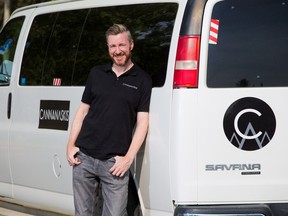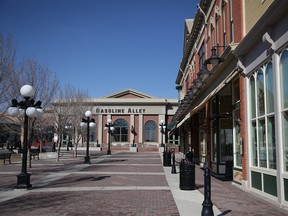
Article content
Nearly four years after pot was legalized in Canada, a Calgary business owner says ongoing stigma and outdated rules are holding back his cannabis-related tourism business from its full potential.
Advertisement 2
Article content
Dave Dormer’s company Cannanaskis gives adult-only cannabis-focused tours in the Rocky Mountains and, until recently, at a site in Calgary.
Dormer isn’t licensed to provide cannabis to clients on his tours. Instead, he talks about the history of the plant, and provides his clients with food and a safe and legal space to consume their own cannabis while on the tour.
“I’m taking you out to the mountains for lunch,” said Dormer. “I’m going to teach you the history of cannabis. I’m gonna serve you lunch. I also will take you to a dispensary so you can purchase legally if you want, or you can bring your own as long as you’re under the legal limit.”
While the concept seems simple, building the business has taken years of working with his insurance company, Alberta Parks and other government officials to ensure adherence to the rules.
Advertisement 3
Article content
Dormer’s tours saw fast uptake from both locals and tourists from around the world. Cannanaskis was even featured in a two-page spread in High Times Magazine — the cannabis-world equivalent of a musician being mentioned in Rolling Stone.
Because mountain tours weren’t viable in the winter months, Dormer looked closer to Calgary for a way to host visitors for his history of cannabis talk. For about a year, Dormer rented a private indoor dining space, fire pit, and a safe outdoor space at Heritage Park where clients could consume their own cannabis. He was even able to provide his clients meals from the Selkirk Grille.
“I got such good reviews,” said Dormer. “I cannot say enough good things about dealing with Heritage Park. They were so great to deal with, and we did it for a year.”
Advertisement 4
Article content
That came to a stop in March when AGLC clarified the rules with Heritage Park. Dormer was told that AGLC’s liquor licence applies to the entirety of Heritage Park, allowing events such as weddings anywhere on the grounds.

In an email, AGLC confirmed that cannabis consumption is not permitted within a space that has a liquor licence.
Dormer said he tried working with the city to get a special events permit, which is what allows events such as the Calgary Folk Festival to have an area where people can legally consume cannabis. But he found his business is outside the parameters of the bylaws.
Calgary’s bylaw surrounding a regulated cannabis consumption area requires things such as fencing, blackout screening and security staff.
Advertisement 5
Article content
Dormer said he’s frustrated that despite being legal to possess, cannabis is still not really legal to consume, except in one’s own home.
“If you go to any events in Calgary, alcohol is at every single event. It’s served. It’s open,” he said. He noted transportation companies can even provide party buses that allow for liquor consumption in a moving vehicle.
Postmedia reached out to the City of Calgary and the province about what they’re doing to advance cannabis-related tourism.
In an emailed statement, the city said it is committed to supporting this emerging sector by “working with AHS and AGLC to ensure opportunities align with City Bylaws and provincial legislation.”
The city noted cannabis consumption can be supported in certain instances under current bylaws.
Advertisement 6
Article content
In an emailed statement, Alberta Treasury Board and Finance press secretary Kassandra Kitz said the province continues to make progress in ensuring businesses remain competitive under cannabis regulations, noting that the province recently made changes to allow online sales of cannabis.
“At this time, we are not pursuing changes for cannabis-related tourism, but remain open to ensuring cannabis, and in fact all sectors, remain as competitive as possible,” said Kitz.
Susan Dupej, a PhD and post-doctoral research fellow at the University of Guelph who specializes in the study of cannabis-related tourism, believes governments at all levels in Canada need to move fast on regulation to allow for the growth of cannabis tourism.
Advertisement 7
Article content
“If Amsterdam has taught us anything, it’s that people want to come and purchase weed, and smoke it where they purchased it,” she said.
Dupej said some American municipalities such as San Francisco are leading the way in creating lounges similar to those in Amsterdam. But she said there are many other possibilities in the sector, including chefs who produce cannabis-infused meals and tours similar to Dormer’s.
She’s seen the development of hospitality licences in California and Colorado, and she thinks that could be the missing policy in Canada. Dupej said change needs to come at all three levels of government, but believes the federal government needs to lead the way.
“There’s so much stigma — so much fear,” said Dupej of cannabis tourism. “I would say you have to let somebody do it, and you have to stand back and watch what happens and document it: what works and what doesn’t work.”
Advertisement 8
Article content
Dormer dreams of someday giving production facility tours and hosting tasting events, just as breweries and vineyards do now with beer and wine. He said he’d even like to develop something similar to the pedal pubs that now operate in Calgary.
Based on numbers from Colorado, Dormer estimates Alberta is missing out on a potential $600 million per year in cannabis-related tourism.
“There needs to be a policy that allows for cannabis tourism,” said Dormer. “Honestly, we need to grow up and have an adult conversation as a society about this stuff.”
Twitter: @brodie_thomas







